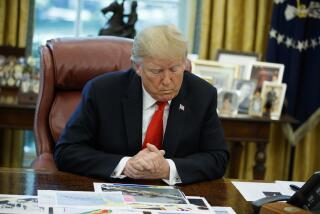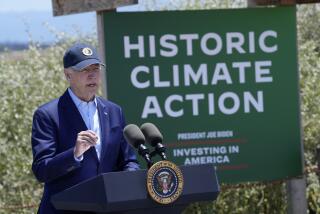Polluters are paying much lower fines under Trump, EPA says
Reporting from Washington — Numbers released by the Trump administration Friday show an 80% drop in some penalties levied against polluters, the latest sign that the Environmental Protection Agency has become a less aggressive watchdog.
Injunctive relief — the amount of money polluters commit to pay to correct problems and prevent them from reoccurring — fell from $20.6 billion in fiscal 2017 to $3.95 billion in fiscal 2018. That represents a 15-year low for the agency.
Civil penalties in 2018 declined to $69 million. That was far less than the $1.68 billion in 2017, but that year’s figure was impacted by fines negotiated during the Obama administration.
Volkswagen agreed in 2016 to a $1.45-billion penalty as punishment for its diesel emissions scandal.
In releasing the figures, EPA officials said they were focused in 2018 on ensuring that facilities were in compliance and expediting site cleanup.
“A strong enforcement and compliance assurance program is essential to achieving positive public health and environmental outcomes,” Susan Bodine, assistant administrator of the Office of Enforcement and Compliance Assurance, said in a statement.
The EPA’s data span fiscal year 2018, which ended Sept. 30. For the most part, the figures reflect enforcement activity — cases that were settled, fines that were assessed — that took place under the Trump administration.
Civil penalties are at their lowest since 1994, when the enforcement office was created, said Cynthia Giles, assistant administrator for the EPA’s enforcement office during the Obama administration.
“EPA is trying to convince media and the public that EPA is still doing its job on enforcement, despite all of the reports showing that isn’t the case,” Giles said in a statement. “Not only are the Trump EPA’s enforcement numbers at historic lows, they are on track to get worse.”
Some of the numbers in Friday’s report suggest that future declines in enforcement are in store. For example, federal inspections and evaluations conducted by the EPA have continued to drop. Last year, the agency conducted about half as many inspections as it did in 2010.
David Coursen, who was an attorney in the EPA’s office of general counsel until 2015, said that the danger of drastically lowering penalties is that it removes the incentive for corporations to follow environmental laws.
“Anytime there’s a reduction, there’s going to be a suggestion that there’s a free pass,” Coursen said. “So the requirement to follow the law is going to be less compelling.”
Last month, the Department of Justice released numbers showing that the EPA had hit a 30-year low in 2018 in the number of pollution cases it referred for criminal prosecution.
More stories from Anna M. Phillips »
More to Read
Get the L.A. Times Politics newsletter
Deeply reported insights into legislation, politics and policy from Sacramento, Washington and beyond. In your inbox three times per week.
You may occasionally receive promotional content from the Los Angeles Times.











